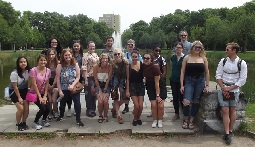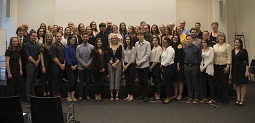
Ohio University students traveled to Germany over the summer to work with students from Leipzig University on a compelling project focusing on the opioid crisis.
Students from both universities participated in the annual OHIO-Leipzig Transatlantic Student Summit, held in Leipzig, Germany. Each year, the summit provides opportunities for academic exchange and joint working experiences. Support and funding from the Scripps College of Communication, the Office of Global Affairs and International Studies, and the College of Arts and Sciences facilitated the expansion of this program to include faculty and students from the Chemistry Department and the E.W. Scripps School of Journalism.
“Bringing students from different backgrounds to confront common issues is the foundation of this program,” said Dr. Matthew LeRiche, director of the Global Leadership Center (GLC). “Including students from journalism and chemistry allowed us to add a valuable, new dimension to this long-standing collaboration with the American Studies program at Leipzig University.”
In past years, the students have examined issues such as security in a transatlantic context and the challenges for people who are part of global migration flows.
This year, Ohio University students from the GLC, the E.W. Scripps School of Journalism, and the Chemistry and Biochemistry Department engaged with their German counterparts on the theme of the opioid crisis and substance abuse. The states of Ohio and Saxony, home to Leipzig University, both confront major challenges in their communities around these issues.
“It was very challenging to work with students from different disciplines and from a different country,” said Hannah Wintucky, a senior in the GLC program. “But after we got to know each other and started to work together, we realized that this collaboration was really beneficial to our work. It made our project much more well-rounded and complete, and we made friends that we would never have met otherwise.”
To approach these common challenges, the student cohorts met up with civil grassroots organizations, engaged with local journalists, toured media outlets and museums, and took various field trips all over central Germany. A variety of scholars also accompanied the program with an intensive schedule of lectures, providing the students with a unique international perspective on opioid crisis, while learning about the rich history of Germany.
“It was really interesting to see how the opioid epidemic is perceived around the world. From experiencing it firsthand in my hometown to seeing it on the news when a celebrity dies from an overdose, this problem truly does permeate through every layer of society in every corner of the earth,” said Alan Sarver, a 2018 graduate of the GLC program and OHIO.
As part of the summit, the students were also engaged in policymaking and consulting for their final projects. The students were charged with creating policy to deal with the opioid crisis and substance abuse. The work was very challenging, but also extremely rewarding.
“The OHIO-Leipzig Summit was definitely the highlight of my past term. It was two weeks of hard work solving the world’s problems, as well as productive learning about policy making, communication and science. And I had a lot of fun bonding with my colleagues from across the pond,” explained Andriyan Andreev, a student studying Political Science and American Studies at Leipzig University. “This was my first time working with American peers within the scope of a project of that scale, and I definitely gathered a lot of useful knowledge and experience. All of the professors, graduate assistants, and coordinators of the summit, as well as all of the students who participated, made this experience truly amazing.”
Experts and diplomats, including representatives from the U.S. Consulate General in Leipzig, sat in the audience and provided the students with feedback on their work.
Overall, this academic collaboration provided for more than cultural exchange and immersion. It created an opportunity for dialogue and crafted an understanding of the relevance of historical events with current social, political and global challenges.
For additional information on the project, as well on Ohio University’s historic partnership with Leipzig University, contact the Global Leadership Center at 740-597-2794 or the Office of Global Affairs 740-593-1840.
